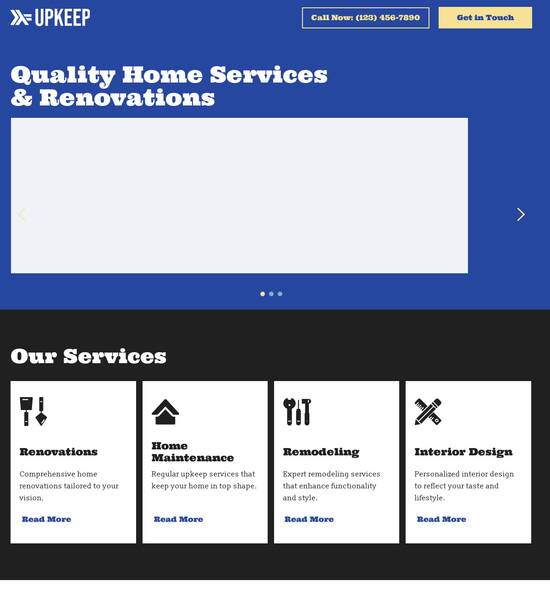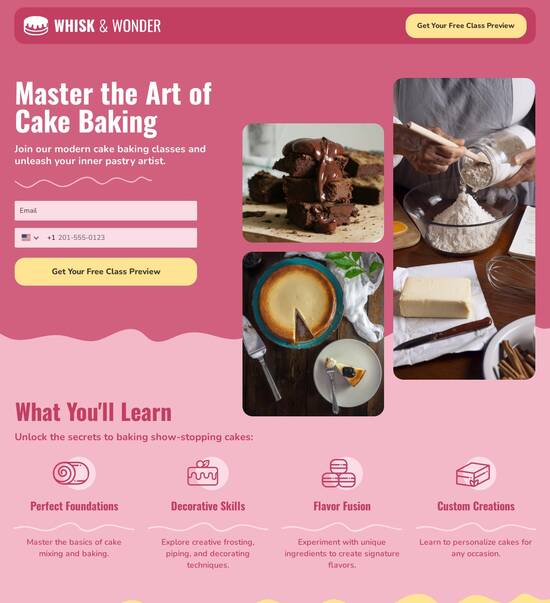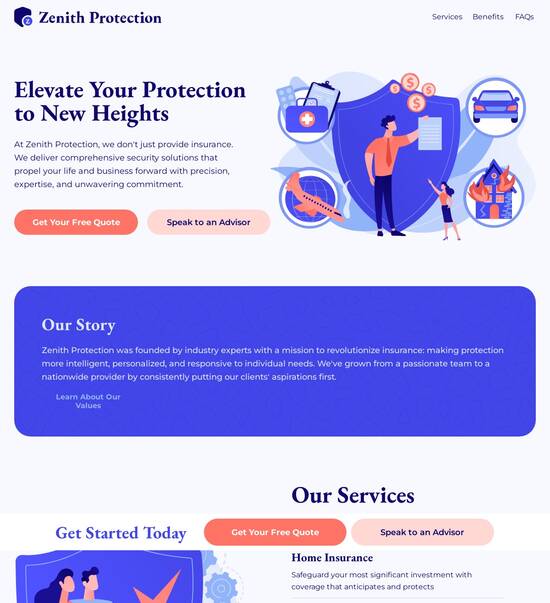
Engaging user journey page template
Explore Similar TemplatesAbout template
Unleash your creativity with the engaging user journey page template. Try Instapage today.
Recommended templates

Easy to build without coding
With the intuitive drag-and-drop builder, anyone on your team can create high-converting pages without any knowledge of code or design. Make enhancements to your landing page with custom widgets using Javascript, HTML/CSS, or third-party scripts.

Multiple layouts for any industry and goal
Select from 500+ landing page layouts built to boost conversions across industry-specific scenarios. Customize them by adjusting fonts, adding images, and generating on-brand content with the AI assistant. Quickly scale with Instablocks® and Global Blocks that you can save, reuse, and update globally.

Loads fast and looks polished on any device
Every template is responsive, which means they present professionally on any device and load blazingly fast with our Thor Render Engine. You can also power them up with Google AMP technology to deliver an unparalleled mobile experience and drive higher conversions.

Robust analytics & experimentation
Get real-time updates and reporting across all your devices, showing the number of visitors, conversions, cost-per-visitor, and cost-per-lead. Launch AI-powered experiments, run A/B tests, and use heatmaps to analyze user behavior, then optimize your landing page to maximize conversions.







Easy to build without coding
With the intuitive drag-and-drop builder, anyone on your team can create high-converting pages without any knowledge of code or design. Make enhancements to your landing page with custom widgets using Javascript, HTML/CSS, or third-party scripts.
Multiple layouts for any industry and goal
Select from 500+ landing page layouts built to boost conversions across industry-specific scenarios. Customize them by adjusting fonts, adding images, and generating on-brand content with the AI assistant. Quickly scale with Instablocks® and Global Blocks that you can save, reuse, and update globally.
Loads fast and looks polished on any device
Every template is responsive, which means they present professionally on any device and load blazingly fast with our Thor Render Engine.
Robust analytics & experimentation
Get real-time updates and reporting across all your devices, showing the number of visitors, conversions, cost-per-visitor, and cost-per-lead. Launch AI-powered experiments, run A/B tests, and use heatmaps to analyze user behavior, then optimize your landing page to maximize conversions.
All the features you need to build lead-generating landing pages
Explore more featuresLearn how to build top-performing landing pages for any goal
FAQs
Leading the way in building high-performing landing pages





Optimize your marketing with the best landing page and CRO platform
In today’s competitive landscape, marketers must create compelling, high-converting landing pages. Instapage, a leading platform in landing page design, empowers you to enhance your marketing strategies and boost return on investment (ROI) effectively.
Understanding the power of landing pages
Landing pages play a pivotal role in the online marketing ecosystem. They serve as a focused touchpoint that drives conversions through strategic design and messaging tailored to specific audiences. By using high-converting templates available on the Instapage platform, marketers can save time and enhance their marketing efficiency.
- Tailored messaging helps in engaging prospects by addressing their specific pain points and interests.
- Visual appeal is crucial as users are more likely to convert on pages that are aesthetically pleasing.
- Testing different layouts with A/B testing ensures that you find the optimal design that drives conversions.
How to create effective landing pages
Creating a high-converting landing page involves several critical steps. First, utilize Instapage’s user-friendly templates, which allow for quick customization. Second, integrate lead capture elements effectively to maximize conversions.
- Choose a template that aligns with your campaign goals for better relevance.
- Incorporate clear calls-to-action (CTA) that guide users toward the desired action.
- Add testimonials or social proof to enhance trust and credibility with potential customers.
Optimizing your landing pages for higher conversions
Optimization is an ongoing process. Utilizing the built-in experimentation features, along with detailed heatmaps and analytics dashboards from Instapage, allows marketers to monitor on-page behavior and iterate strategies.
- Conduct A/B testing to evaluate different headlines or images for effectiveness.
- Use heatmaps to identify where users click and adjust content placement accordingly.
- Track metrics such as conversion rates and average time on page to refine page elements.
With these techniques, you can ensure your landing pages are tailored to convert, adapt to user behavior, and maximize ROI.
Getting started with Instapage is straightforward and will significantly impact your marketing success. Begin by exploring the range of customizable templates available.
To transform your digital marketing campaigns, sign up for Instapage today and discover the difference robust landing pages can make!
People also ask about Engaging user journey page template
Understanding the user journey: A deep dive into engaging user journey page templates
The essence of user journey mapping
User journey mapping is pivotal in understanding how customers interact with a brand. It involves visualizing the process a user goes through from initial awareness to post-purchase evaluation. Mapping this journey helps businesses identify touchpoints that may enhance or hinder the customer experience. Overall, a well-defined user journey can make the path to conversion significantly smoother.
The significance of customer experience cannot be overstated. Research indicates that businesses prioritizing customer experience outperform competitors in revenue growth and customer loyalty. When companies understand the user journey, they can craft tailored experiences that resonate with customers, ultimately leading to improved retention rates and higher satisfaction levels.
Crafting effective customer journey map templates
An effective customer journey map template should encompass various features designed to enhance usability and drive engagement. Key features include clear visual elements, intuitive layouts, and easy navigation. Visuals such as graphs, icons, and color-coded stages make the map interesting and easier to understand at a glance. Integration with existing business tools is crucial; the template should be compatible with customer relationship management (CRM) systems and analytical software.
Different types of customer journey map templates serve distinct purposes. For instance, linear maps are ideal when the customer journey follows a straightforward path, while circular maps provide a view of ongoing interactions. Swimlane diagrams are excellent for team collaboration as they show interactions across departments and allow for shared ownership. Timeline-based templates work well for illustrating sequential phases of a journey, making them useful for complex sales processes.
The parts of a customer journey map
Mapping out the stages of the customer journey allows businesses to pinpoint opportunities for improvement. It typically consists of four stages: awareness, consideration, decision, and loyalty. During the awareness stage, potential customers discover the brand through various channels. The consideration stage focuses on providing valuable content that empowers potential customers to evaluate their options, ultimately leading them to the decision stage, where they finalize their purchase.
The loyalty stage is equally important; here, the goal is to retain customers and enhance their satisfaction. This involves strategies such as personalized follow-ups, loyalty programs, and regular engagement through email or social media. Critical elements for an effective journey map include customer personas to tailor experiences, identifying touchpoints crucial for the user's journey, pain points that reveal where improvements are necessary, and customer goals to align the journey with user expectations.
The role of teams in mapping customer journeys
Cross-functional collaboration plays a vital role in creating comprehensive customer journey maps. Engaging marketing, sales, and product teams ensures a unified approach that reflects all aspects of the customer experience. Each department can provide unique insights that enhance understanding and mapping of the journey, leading to a more holistic view of customer interactions.
Moreover, leveraging tools and technologies can facilitate team efforts in the mapping process. Software solutions that allow for real-time collaboration enable teams to share data and insights quickly. Integration with CRM systems enhances the effectiveness of journey mapping by allowing teams to centralize information and extract meaningful insights that can inform future strategies.
Streamlining the customer experience with templates
Utilizing customer journey map templates can significantly streamline the mapping process. Templates save time by providing a ready-made structure that teams can adapt to their unique needs. This efficiency is particularly beneficial for teams of varying sizes that may lack dedicated resources for journey mapping from scratch. Additionally, templates reduce the risk of errors and improve the accuracy of the maps.
Customization is another crucial aspect of these templates. While generic templates provide a strong foundation, adapting them for specific business contexts enhances their relevance. This could involve adjusting visuals to reflect brand identity or incorporating content that resonates with the target audience, thereby ensuring that the user journey aligns closely with business objectives.
Enhancing user engagement through innovative features
Integrating interactive elements into journey mapping can significantly boost user engagement. Dynamic visuals and transitions that respond to user interactions make the mapping experience more engaging. Multimedia elements such as videos, infographics, and sound can further enrich the customer’s journey, making it more enjoyable and memorable.
Moreover, incorporating analytics integration allows businesses to monitor user interactions effectively. Tools that provide real-time feedback enable teams to adjust maps based on actual customer behavior, ensuring that the journey remains relevant and effective. These features not only enhance the user experience but also offer valuable insights that can be leveraged for future marketing and product development strategies.
The impact on business growth and customer success
User journey insights can significantly drive business strategy by identifying potential growth opportunities. Understanding where customers experience joy or frustration allows companies to refine their offerings strategically. Aligning user journeys with broader business objectives ensures that marketing efforts focus on fulfilling customer needs while driving profitability.
In tandem with customer success plans, journey mapping creates a cohesive strategy for enhancing customer interactions. It bridges the gap between customer support and marketing, offering a unified view of all customer engagements. This holistic approach enables businesses to optimize their strategies, ensuring customers feel supported and valued throughout their journey.
Best practices for utilizing engagement user journey page templates
When using user journey page templates, design plays a crucial role in capturing attention. It’s vital to balance aesthetic appeal with functionality. Clear markers and callouts for essential touchpoints should be incorporated to guide users effectively, ensuring they understand the journey at a glance.
Iterative improvement based on user feedback is another best practice. Establishing a cycle where templates are frequently revisited and refined based on user interactions ensures that the journey remains relevant. Encouraging teams to experiment with different formats and innovations can lead to creative solutions that enhance the overall user journey.
Future trends in user journey templates
Looking ahead, several trends are poised to influence user journey mapping. The advent of artificial intelligence and machine learning technologies offers exciting opportunities for automating aspects of customer journey mapping. These advanced tools can analyze user behavior patterns more accurately, allowing for more personalized experiences that adapt to individual user preferences.
Moreover, the growing emphasis on personalization highlights the need for dynamic templates that can adjust as customer preferences evolve. Organizations must stay ahead of trends by engaging their teams in continuous learning and adapting templates based on real-world customer behavior. This proactive approach will help businesses remain competitive in a rapidly changing market.
Conclusion: Transforming your approach to customer journeys
Engaging user journey page templates are transformative tools that can fundamentally change how businesses approach customer interactions. By mapping the user journey effectively, organizations can create experiences that prioritize the voice of the customer, leading to greater satisfaction and loyalty.
As we move forward, the importance of understanding user experiences will become increasingly vital for successful business strategies. The future will demand that organizations prioritize these insights, ensuring that customer experiences are not only respected but cherished at every touchpoint.
Ready to skyrocket conversions?
Supercharge your ad campaigns with high-performing landing pages
Get started














